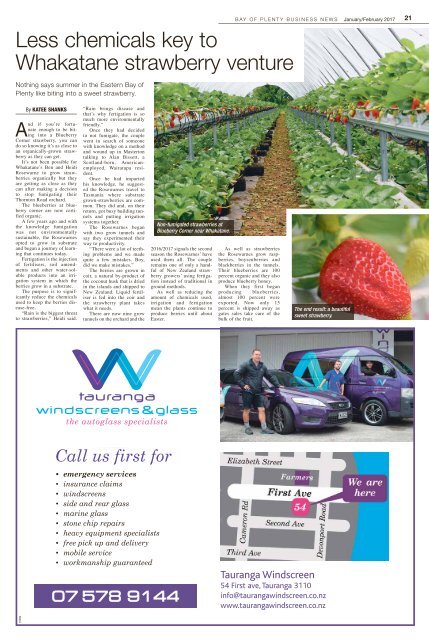Bay of Plenty Business News January/February 2017
From mid-2016 Bay of Plenty businesses have a new voice, Bay of Plenty Business News. This new publication reflects the region’s growth and importance as part of the wider central North Island economy.
From mid-2016 Bay of Plenty businesses have a new voice, Bay of Plenty Business News. This new publication reflects the region’s growth and importance as part of the wider central North Island economy.
Create successful ePaper yourself
Turn your PDF publications into a flip-book with our unique Google optimized e-Paper software.
Less chemicals key to<br />
Whakatane strawberry venture<br />
Nothing says summer in the Eastern <strong>Bay</strong> <strong>of</strong><br />
<strong>Plenty</strong> like biting into a sweet strawberry.<br />
BAY OF PLENTY BUSINESS NEWS <strong>January</strong>/<strong>February</strong> <strong>2017</strong> 21<br />
By KATEE SHANKS<br />
And if you’re fortunate<br />
enough to be biting<br />
into a Blueberry<br />
Corner strawberry, you can<br />
do so knowing it’s as close to<br />
an organically-grown strawberry<br />
as they can get.<br />
It’s not been possible for<br />
Whakatane’s Ben and Heidi<br />
Rosewarne to grow strawberries<br />
organically but they<br />
are getting as close as they<br />
can after making a decision<br />
to stop fumigating their<br />
Thornton Road orchard.<br />
The blueberries at blueberry<br />
corner are now certified<br />
organic.<br />
A few years ago and with<br />
the knowledge fumigation<br />
was not environmentally<br />
sustainable, the Rosewarnes<br />
opted to grow in substrate<br />
and began a journey <strong>of</strong> learning<br />
that continues today.<br />
Fertigation is the injection<br />
<strong>of</strong> fertilisers, soil amendments<br />
and other water-soluble<br />
products into an irrigation<br />
system in which the<br />
berries grow in a substrate.<br />
The purpose is to significantly<br />
reduce the chemicals<br />
used to keep the berries disease-free.<br />
“Rain is the biggest threat<br />
to strawberries,” Heidi said.<br />
“Rain brings disease and<br />
that’s why fertigation is so<br />
much more environmentally<br />
friendly.”<br />
Once they had decided<br />
to not fumigate, the couple<br />
went in search <strong>of</strong> someone<br />
with knowledge on a method<br />
and wound up in Masterton<br />
talking to Alan Bissett, a<br />
Scotland-born, Americanemployed,<br />
Wairarapa resident.<br />
Once he had imparted<br />
his knowledge, he suggested<br />
the Rosewarnes travel to<br />
Tasmania where substrate<br />
grown-strawberries are common.<br />
They did and, on their<br />
return, got busy building tunnels<br />
and putting irrigation<br />
systems together.<br />
The Rosewarnes began<br />
with two grow tunnels and<br />
say they experimented their<br />
way to productivity.<br />
“There were a lot <strong>of</strong> teething<br />
problems and we made<br />
quite a few mistakes. Boy,<br />
did we make mistakes.”<br />
The berries are grown in<br />
coir, a natural by-product <strong>of</strong><br />
the coconut husk that is dried<br />
in the islands and shipped to<br />
New Zealand. Liquid fertiliser<br />
is fed into the coir and<br />
the strawberry plant takes<br />
what it needs.<br />
There are now nine grow<br />
tunnels on the orchard and the<br />
Non-fumigated strawberries at<br />
Blueberry Corner near Whakatane.<br />
2016/<strong>2017</strong> signals the second<br />
season the Rosewarnes’ have<br />
used them all. The couple<br />
remains one <strong>of</strong> only a handful<br />
<strong>of</strong> New Zealand strawberry<br />
growers’ using fertigation<br />
instead <strong>of</strong> traditional in<br />
ground methods.<br />
As well as reducing the<br />
amount <strong>of</strong> chemicals used,<br />
irrigation and fertigation<br />
mean the plants continue to<br />
produce berries until about<br />
Easter.<br />
As well as strawberries<br />
the Rosewarnes grow raspberries,<br />
boysenberries and<br />
blackberries in the tunnels.<br />
Their blueberries are 100<br />
percent organic and they also<br />
produce blueberry honey.<br />
When they first began<br />
producing blueberries,<br />
almost 100 percent were<br />
exported. Now only 15<br />
percent is shipped away as<br />
gates sales take care <strong>of</strong> the<br />
bulk <strong>of</strong> the fruit.<br />
The end result: a beautiful<br />
sweet strawberry.<br />
07 578 9144<br />
Tauranga Windscreen<br />
54 First ave, Tauranga 3110<br />
info@taurangawindscreen.co.nz<br />
www.taurangawindscreen.co.nz<br />
15094<br />
Hamilton Windscreen LWP.indd 1<br />
2/12/10 9:23:50 AM


















